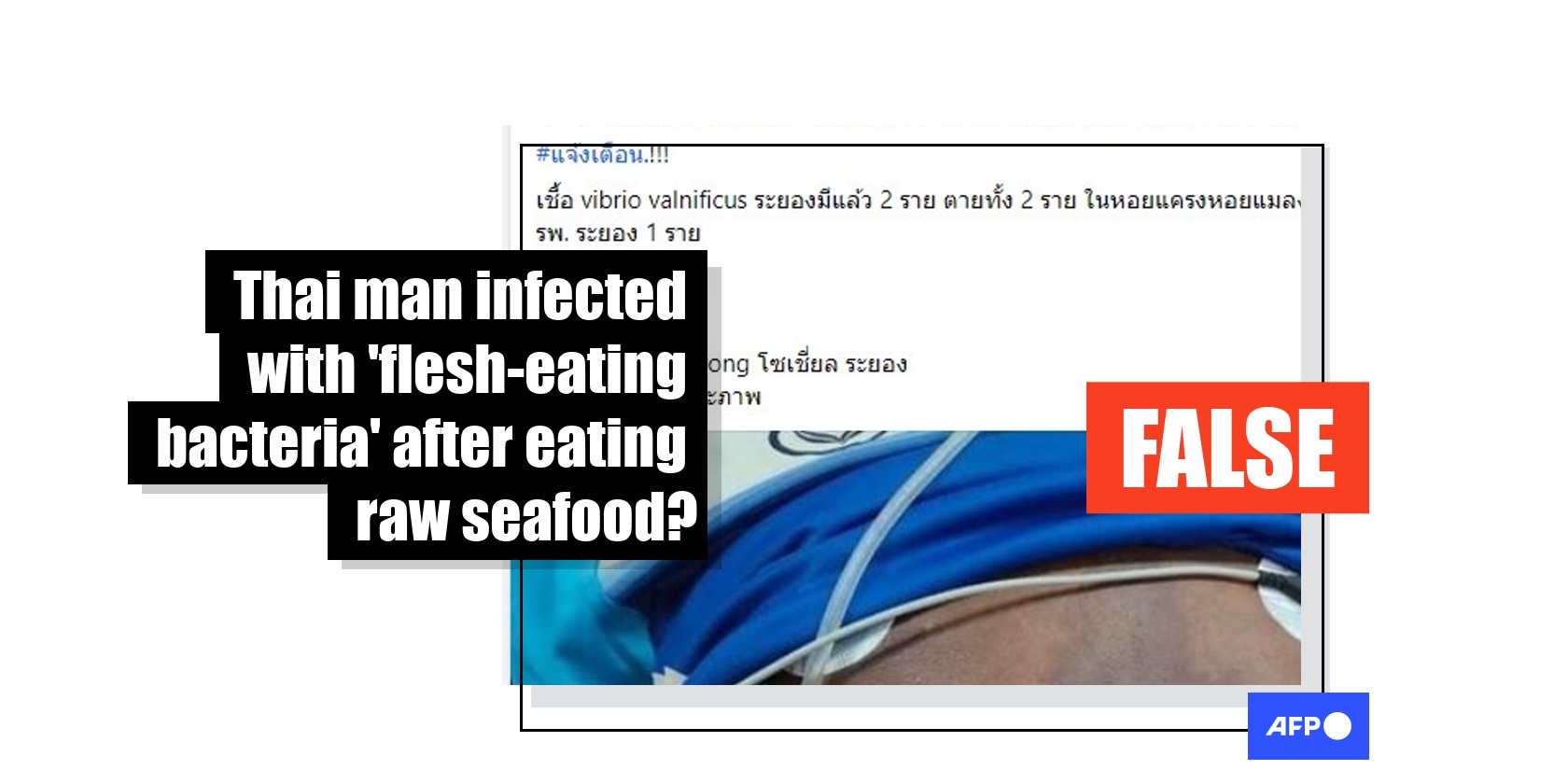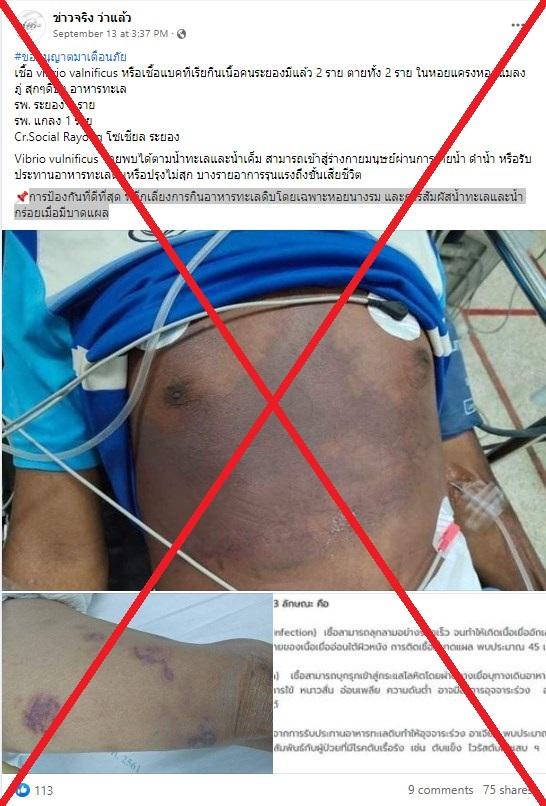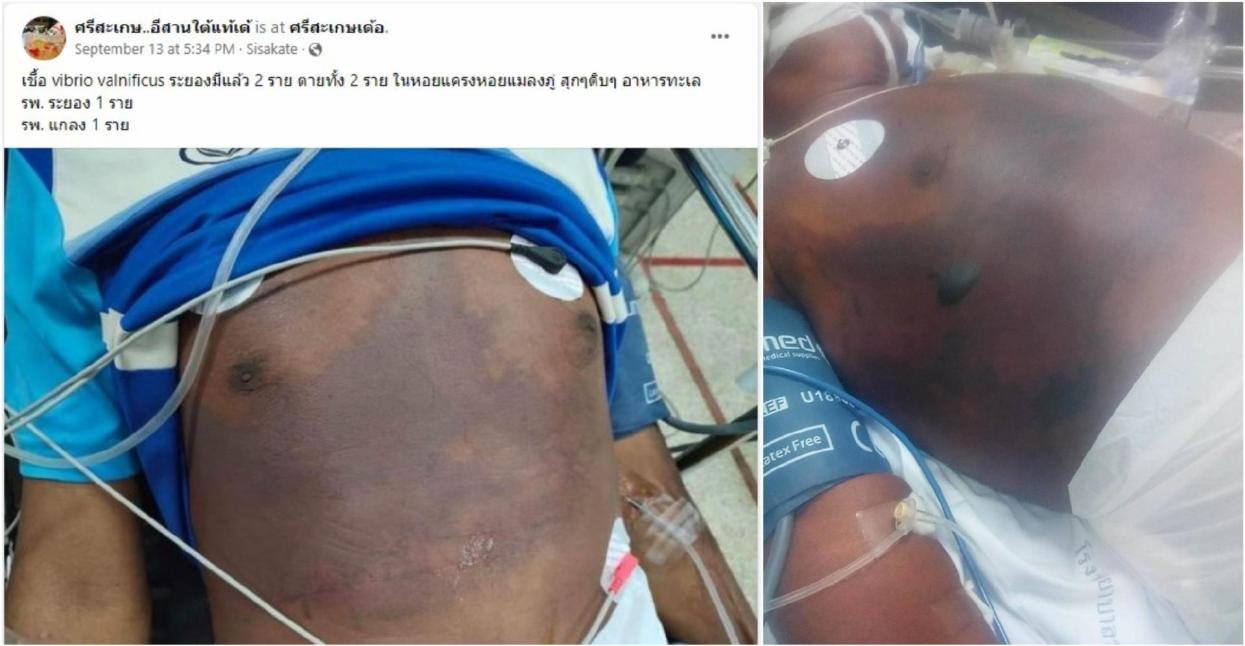
Thai social media posts spread false 'flesh-eating bacteria' claim
- This article is more than two years old.
- Published on October 2, 2023 at 08:05
- 3 min read
- By Chayanit ITTHIPONGMAETEE, AFP Thailand
"There have been two cases of Vibrio vulnificus infection in Rayong. Both died from eating undercooked and raw cockles, mussels and seafood," reads a Thai-language post on Facebook from September 13.
Rayong is a coastal province in eastern Thailand and a popular destination for tourists in search of fresh ocean produce.
The Facebook post contains a picture of a person's torso with the skin discoloured. The text claims two people were infected by Vibrio vulnificus, a type of bacteria found naturally in marine waters.
Vibrio vulnificus infects people via an open wound while swimming or transmits through consumption of raw or undercooked seafood, according to the US Centers for Disease Control and Prevention (CDC) (archived link).
In severe cases the flesh around an open wound dies, which has led some media to label Vibrio vulnificus the "flesh-eating bacteria".
"One patient died at Rayong Hospital while another died at Klaeng Hospital," the post claims. It has been shared more than 100 times.
Content warning
The post surfaced after the CDC issued an alert on September 1 following the deaths of at least a dozen people from Vibrio vulnificus in the United States in 2023 (archived links here and here).
Similar false posts have been shared elsewhere on Facebook here, here and here, prompting Thai social media users to leave comments saying they would stop eating seafood.
"No more eating cockles and mussels for life," wrote one.
"I'll stop eating seafood for a long while," another said.
Thai authorities told AFP the claim about two people dying from Vibrio vulnificus is false and the photo actually shows a man stung by a jellyfish in 2020.
No Rayong deaths
Rayong's public health authority dismissed the claim in a September 13 post on its Facebook page, calling it "fake news" (archived link).
"The photo is not related to the CDC's news about flesh-eating bacteria," its statement said.
A similar statement was issued by the government's National News Bureau of Thailand on the same day (archived link).
A Rayong health official told AFP on September 14 that "there have been no reports of deaths linked to eating undercooked seafood this year".
"Currently, Rayong province has not seen any patient who died from Vibrio vulnificus as claimed," Dr Sunthorn Rheanpumikankit said.
Jellyfish sting
Moreover, AFP found the image actually shows a Thai fisherman who was stung by a jellyfish in Rayong three years ago.
A keyword search on Google revealed that a photo of his discoloured torso taken from a slightly different angle was published in July 2020 by local media.
News reports here and here say the 49-year-old was out diving for fish when he was stung and later died from his wounds (archived links here and here).
He was pronounced dead at a hospital in Rayong, according to a statement from the Klaeng Hospital on September 26, 2023 issued in response to an enquiry from AFP. The hospital said the photo in the Facebook posts shows the jellyfish victim.
"The male patient, aged 49, came into contact with a jellyfish. He was admitted to Klaeng Hospital on July 23, 2020, before being referred to Rayong Hospital on the same day," reads the statement.
"Following the treatment, the patient died at Rayong Hospital on July 24, 2020."
Below is a screenshot comparison between the false post on Facebook (left) and a photo of the man's torso published by local media (right):
Copyright © AFP 2017-2026. Any commercial use of this content requires a subscription. Click here to find out more.
Is there content that you would like AFP to fact-check? Get in touch.
Contact us


